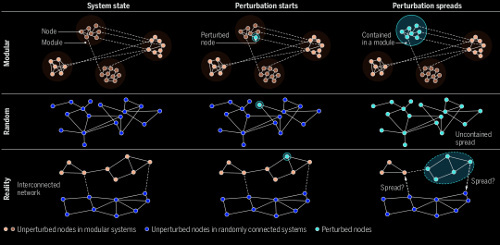The importance of being modular
Times cited: 29
Sales-Pardo, M.
Science
357 (6347)
,
128
-129
(2017).
In the 1970s, ecologists began to speculate that modular systems—which are organized into blocks or modules—can better contain perturbations and are therefore more resilient against external damage (1). This simple concept can be applied to any networked system, be it an ecosystem, cellular metabolism, traffic flows, human disease contagion, a power grid, or an economy (2, 3). However, experimental evidence has been lacking (4). On page 199 of this issue, Gilarranz et al. (5) provide empirical evidence showing that modular networked systems do indeed have an advantage over nonmodular systems when faced with external perturbations.
